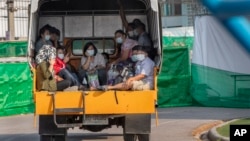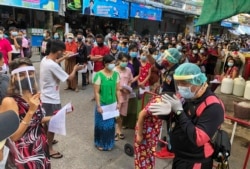Thailand’s Health Ministry reported on Friday that at least 153 Cambodian workers in Thailand tested positive for COVID-19, as it faces a new viral outbreak that is spreading fast through the country’s citizens and migrant worker communities.
A COVID-19 report from Thailand’s Department of Disease Control revealed that there are more than 9,800 cases since the start of the pandemic, with 153 Cambodian migrant workers infected from the recent outbreak in the south of Thailand.
Migrant worker communities have been hard hit by the recent outbreak. Thai nationals, Burmese, Indian and Cambodian workers recorded the most cases across the country, according to the same report.
Koy Kuong, Foreign Ministry spokesperson, said Cambodian authorities in Thailand were monitoring and verifying the number of cases among Cambodian migrant workers.
“The Thai authorities will treat all foreign migrant workers free of charges, similar to Thais,” he said.
“The [Cambodian] Embassy is paying the utmost attention to helping all Cambodian migrants in Thailand.”
Or Vandine, a spokesperson for the Cambodian Health Ministry, said she was not aware of the number of cases in Thailand. The Thai Health Ministry could not be reached for comment on Friday.
The Thai Embassy in Phnom Penh said on Thursday that a new wave of COVID-19 was detected on December 17 in Samut Sakhon province, and had now affected two-thirds of all provinces in Thailand.
“Active case findings, investigations and targeted testing have been carried out, especially among migrant workers in Samut Sakhon as well as risk groups,” the embassy said in an email.
“The government has provided assistance and medical care to migrant workers in Samut Sakhon, as well as for Thai nationals. All workers who have been tested positive are under treatment in different hospitals.”
The Thai embassy said its government had discouraged migrant worker communities from moving around, especially those wishing to return to their home country, facilitating their documentation and registration under new provisions.
As of January 5, more than 5,000 Cambodians have returned home and, according to the Health Ministry, 21 Cambodian migrant workers tested positive for COVID-19.
Krong Savan, a 40-year-old construction worker in Thailand, said she and her 18-year-old daughter wanted to return to Cambodia but were not allowed to leave during the outbreak.
“I want Cambodian authorities to come and visit us in Thailand. We have faced a lot of difficulties,” said Krong Savan, who works at a hotel construction site in the outskirts of Thailand.
“Everyone wants to go home, but they can’t.”
Khun Tharo, a program coordinator at labor rights group Central, said Cambodian migrant workers, especially in the construction sector, have lost at least 40 percent of their income in Thailand, with most earning around $10 a day.
He was concerned about undocumented Cambodian workers who will not receive wage benefits been given by Thai authorities.
“The concern is about Cambodian workers working illegally there. They have lost jobs and they can’t earn any income there,” Khun Tharo said.
He urged workers to continue staying there to avoid traveling, which could lead to further transmission of the contagious virus.
Cambodia has increased its health screening and quarantine facilities along border provinces to accommodate an increase in migrant worker arrivals.
Thailand is home to around 1.2 million Cambodian migrant workers, according to Cambodian government estimates, a significant number of whom are undocumented.
A 2019 International Organization for Migration report showed that a third of migrant workers surveyed were unemployed before leaving Cambodia, nearly half had zero income and around two-thirds moved to Thailand due to a lack of job opportunities in Cambodia and to earn a better income.








